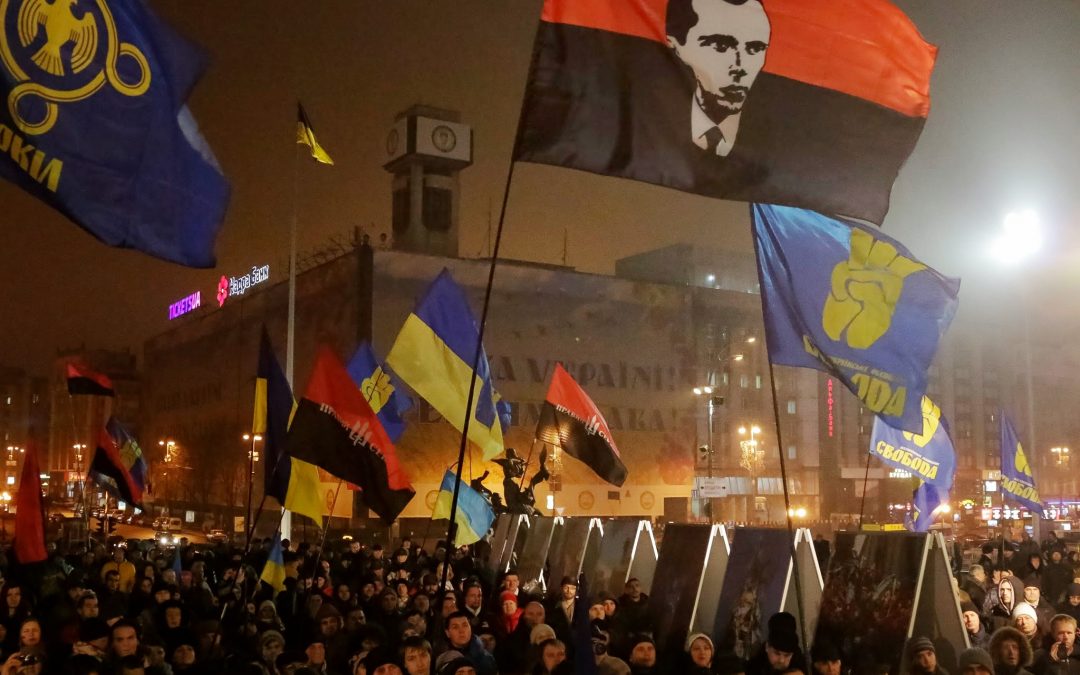Poland’s foreign ministry has intervened after Ukraine’s ambassador to Germany denied that Ukrainian nationalist leader Stepan Bandera was responsible for the mass murder of ethnic Poles and Jews, and also sought to justify his collaboration with Nazi Germany.
The episode has renewed tensions over what has long been a sensitive issue in Polish-Ukrainian relations. In response, Ukraine’s foreign ministry has distanced itself from the words of the ambassador, Andrii Melnyk, saying that they were just his “own opinion”.
Ukraiński ambasador w Berlinie Andrij Melnyk na pytanie o Bandere i zbrodnie wołyńskie odpowiada, że "takich samych masakr" dopuszczali się Polacy wobec Ukraińców. Na temat Bandery nie jest w stanie wykrztusić żadnego słowa krytyki. https://t.co/W4gaRazuJq
— Łukasz Grajewski (@lukaszgrajewski) June 30, 2022
The remarks came in an interview on the Jung & Naiv show in Germany. The ambassador was asked by host Tilo Jung about Stepan Bandera, leader of the Organisation of Ukrainian Nationalists (OUN), which carried out massacres and ethnic cleansing of Poles and Jews.
Jung asked Melnyk how a figure resposible for mass murder could be treated as a hero today in Ukraine. The ambassador answered by claiming that “Bandera was not a mass murderer of Jews and Poles”. He said that such claims are part of a “Russian narrative”.
Jung then quoted a propaganda leaflet signed by Bandera calling for Russians, Poles, Hungarian and Jews to be “wiped out”. Melnyk responded that he “will not distance myself from it. That’s my decision [even if] you may not understand it”.
The Polish and Israeli ambassadors to Ukraine have condemned a decision to name a stadium in Ternopil after Roman Shukhevych, a collaborator with Nazi Germany who is linked to the wartime massacres of ethnic Poles and Jews https://t.co/FsqzTNQ3Bn
— Notes from Poland 🇵🇱 (@notesfrompoland) March 12, 2021
“There is no evidence that the Banderites murdered hundreds of thousands of Jews,” claimed Melnyk. Regarding the murder of Poles, he argued that “there were also massacres of Poles against Ukraine…It was a war”.
He also said that ethnic Ukrainians had been persecuted in interwar Poland “in a way that is hard to imagine” and that for Ukrainians Poland was an enemy in the same way as was the Soviet Union and Nazi Germany.
On the issue of Bandera’s collaboration with Nazi Germany, the ambassador noted that there were “collaborators all over Europe – in France, Belgium, in every country”. Bandera was simply using the conflict between Nazi Germany and the Soviet Union to gain independence for Ukraine, he argued.
President Duda spoke at a ceremony in Ukraine to honour the victims of the Volhynia massacre, referring to it as a 'genocide' of 100,000 ethnic Poles by Ukrainians. He also acknowledged that Ukrainians were then killed by Poles in 'retaliatory actions' https://t.co/xEVP2ZYCxp
— Notes from Poland 🇵🇱 (@notesfrompoland) July 8, 2018
Melnyk’s comments quickly drew condemnation. In a widely shared post, pianist Igor Levit – who was born to a Jewish family in Russia but has lived in Germany since childhood – called the remarks a “shameful…denial of history”.
Former Polish foreign minister Witold Waszczykowski, who is now an MEP for the ruling Law and Justice (PiS) party, criticised the ambassador’s words as a “strange thanks for Poland’s [support of Ukraine’s] EU candidacy, hosting millions of [Ukrainian] refugees and donating large amounts of weapons”.
Last night, Poland’s current foreign minister, Zbigniew Rau, announced that he had spoken with his Ukrainian counterpart Dmytro Kuleba about Melnyk’s “false statements”. He thanked Kuleba for his “quick public intervention in this matter”.
Poland and Ukraine together must face both attempts of provocation and a lack of prudence and responsibility.
— Zbigniew Rau (@RauZbigniew) June 30, 2022
The latter was a reference to a statement released by the Ukrainian foreign ministry in which it said that the ambassador’s comments were “his own opinion and do not reflect the position of the Ministry of Foreign Affairs of Ukraine”.
The ministry thanked Poland for its “unprecedented support in the fight against Russian aggression”, adding that “there are no issues that divide us because both Kyiv and Warsaw share a complete understanding of the need to preserve unity in the face of shared challenges”.
Ukrainische Regierung distanziert sich von Melnyks Aussagen https://t.co/C4OnxTq022 pic.twitter.com/VDyaxZzGMN
— Tilo Jung (@TiloJung) June 30, 2022
Between 1943 and 1945, Bandera’s UPA led an ethnic cleansing operation that resulted in the deaths of up to 100,000 Poles, in what is known as the Volhynia massacre. Polish state authorities, including parliament, have recognised the killings as a genocide, though Ukraine has denied this.
The issue has long been a source of tension between the two countries. Last year, the Polish and Israeli ambassadors to Kyiv jointly condemned the naming of a stadium in Ukraine after a collaborator with Nazi Germany who is linked to the massacres of ethnic Poles and Jews.
However, there have also been efforts to reach an understanding over the difficult history. In 2020, the two countries’ presidents, Andrzej Duda and Volodymyr Zelensky, jointly declared a desire to “respect historical truth”, including allowing the exhumation of victims (something authorities in Ukraine had previously blocked).

Daniel Tilles is editor-in-chief of Notes from Poland. He has written on Polish affairs for a wide range of publications, including Foreign Policy, POLITICO Europe, EUobserver and Dziennik Gazeta Prawna.




















